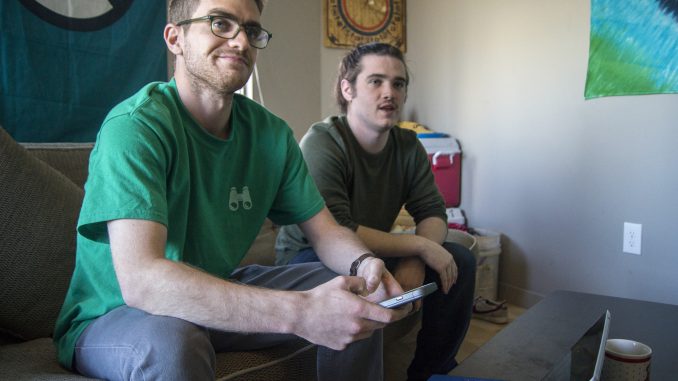
With the redevelopment of their marketplace app Habitat, Andrew Nakkache and Michael Paszkiewicz want to help students bring food trucks right to their doors.
Temple first got a glimpse of Habitat in April 2015 when the app was originally launched for students to buy, sell and trade items with one another on campus in a secure, easy-to-use way.
The two founders quickly saw this business model was not working in the Temple market. So, Nakkache and Paszkiewicz went to Las Vegas to attend the Collision Summit this past summer in search of new ideas.
Since returning from the conference, Habitat relaunched on Sept. 1 as a food truck delivery service exclusively for Temple students, faculty and staff.
During their time at the summit, Nakkache and Paszkiewicz saw a keynote speech given by Tim Draper, a venture capitalist, whom both founders talked to backstage. After explaining their product, Draper was not completely sold on the pitch; however, he advised them to start more simple.
“‘Drive one item into the marketplace and become really good at doing that one thing, then branch out,’” Nakkache said Draper told them.

After the two returned home, they scrapped everything they previously had with Habitat and started fresh. They figured the business model would need to change from a traditional marketplace, which had already been done by other services like letgo, a mobile classifieds app which allows users to buy and sell items locally.
Later that summer, Nakkache and Paszkiewicz surveyed local food vendors around Temple and found that of more than 40 vendors in the area, only 10 accepted credit cards, 16 had online menus and only one delivered.
The two founders realized they would be able to provide a service that had not been implemented at Temple.
Nick Greenawalt, a recent Temple alumnus in graphic design, designed the new look for the app and helped solidify a large part of the process for the new launch. He feels the service will be able to differentiate itself enough from others like it.
“I think the interesting thing about the app is how it’s built to support many different avenues,” Greenawalt said. “We built it after months of planning out Habitat’s future, so each element we want to introduce down the line will work with the system we have created.”
After finalizing the design of the new app, partnering up with vendors and validating their market, Habitat reestablished itself. Nakkache said the launch featured five vendors, and they did all the deliveries themselves.
Now, Habitat has 42 vendors, along with plenty of ‘runners’ to cover the half-mile radius Habitat services.
Since providing vendor delivery to Temple students and faculty, Nakkache said business has been successful with each month seeing a 90 percent growth in transactions. He added that more users are joining the app every month.
Students need a Temple email address to have food from a Temple food truck or restaurant delivered. All sales and transactions are done securely and in-app through Habitat, so no cash is required.
In the future, Habitat plans to offer meal plans to students and offer the ability for parents to add money to student accounts for meals. This will allow students to put a base amount of money into their account, and order meals from Temple vendors as they wish.
Henry Savage can be reached at henry.savage@temple.edu.
Video by Justin Harrison.


Be the first to comment